Key takeaways:
- The fear of rejection often hinders personal growth, but viewing it as a stepping stone can build resilience and improve one’s writing.
- Building a supportive community and sharing experiences can significantly alleviate the fear of rejection and foster confidence.
- Recognizing and celebrating small victories helps maintain motivation and encourages ongoing progress in the writing journey.
- A growth mindset is essential; rejections should be seen as opportunities for improvement rather than personal failures.
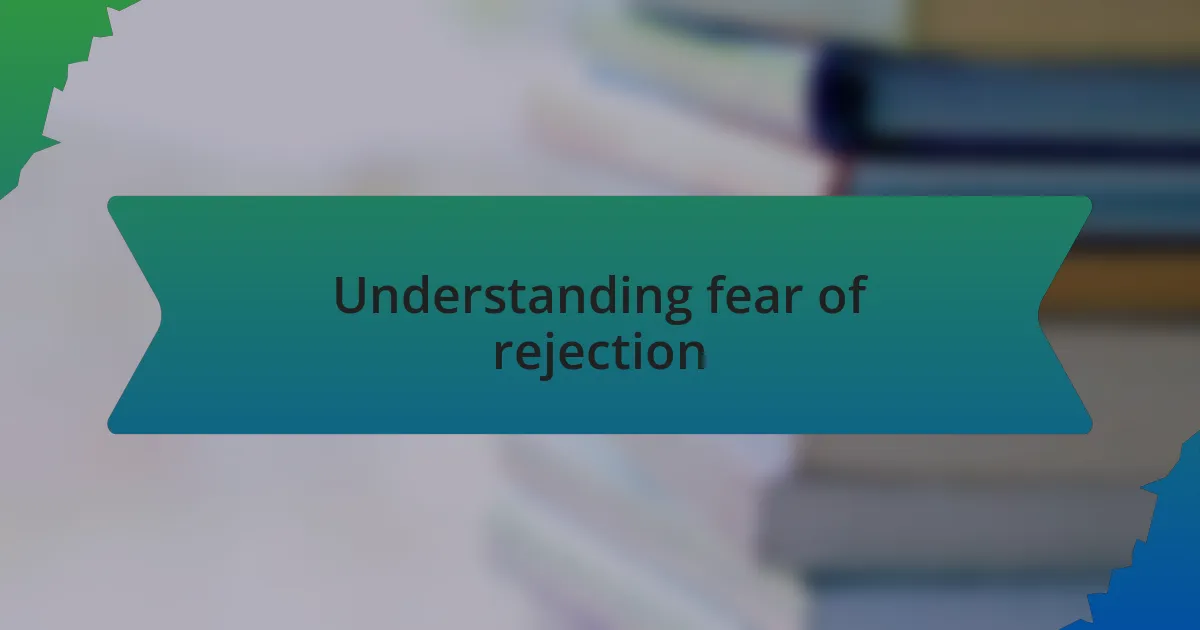
Understanding fear of rejection
The fear of rejection often stems from our deep-seated need for acceptance and validation. Reflecting on my own journey, I recall times when the mere thought of sharing my work felt like standing on a stage, naked, under bright lights. How often do we let that fear paralyze us, only to sabotage our own potential?
Rejection carries a unique weight that can make us question our self-worth. I remember receiving feedback on a manuscript I had poured my soul into, only to be met with silence. In that moment, I felt as though my dreams were dismissed alongside my words. Isn’t it fascinating how rejection can feel more personal than just a critique of our work?
Understanding this fear is crucial, especially in the realm of independent publishing. Each rejection can seem like a confirmation of our insecurities, but I’ve learned that they are merely stepping stones in growth. Have you considered that each “no” might be opening the door to the right “yes”? Embracing this perspective has transformed my relationship with rejection into a source of resilience.
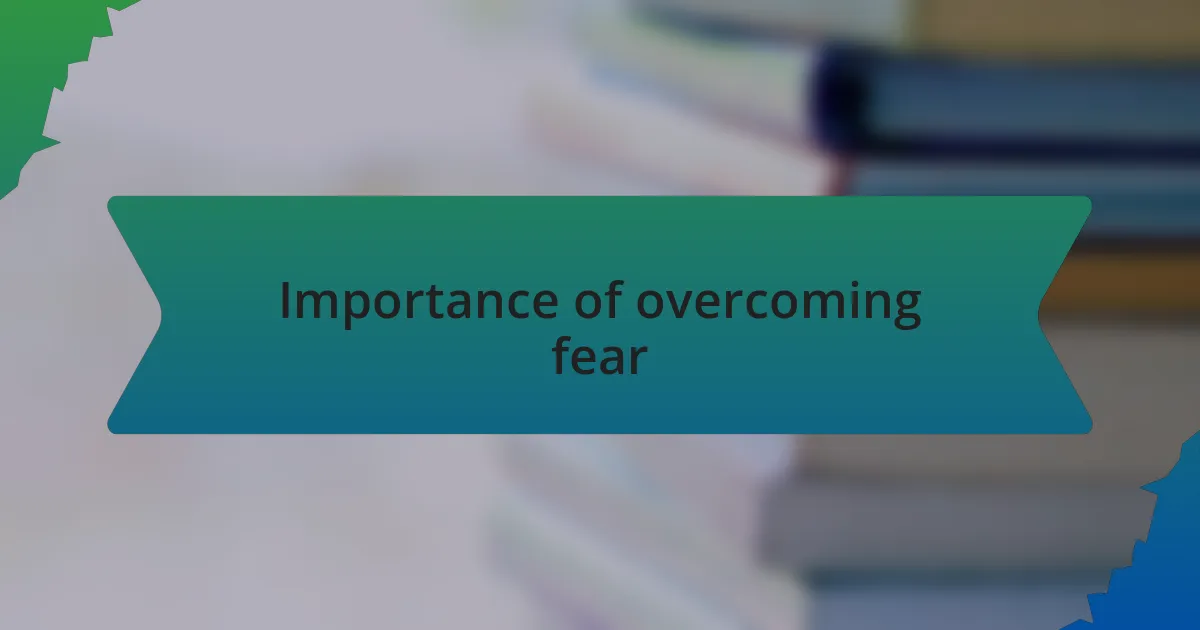
Importance of overcoming fear
Overcoming the fear of rejection is vital for personal growth and success. I remember when I hesitated to submit my first short story; the fear of criticism held me back. The moment I finally hit “send,” I realized that the act itself was a victory, proving that stepping beyond my comfort zone can lead to some exhilarating possibilities.
Acknowledging this fear gives us the power to reshape it. I once attended a writers’ workshop where sharing our work felt like exposing our hearts. Every reading session filled me with dread, but the supportive feedback from others turned that fear into a motivation to improve. Have you found that the discomfort of vulnerability can sometimes lead to the most rewarding experiences?
In the context of independent publishing, conquering this fear is essential. I recall a turning point where I faced rejection from a publisher I had dearly hoped would accept my manuscript. Instead of viewing it as a failure, I chose to see it as a chance to revise and strengthen my writing. Isn’t it liberating to think that every rejection could push us closer to our ultimate goal?
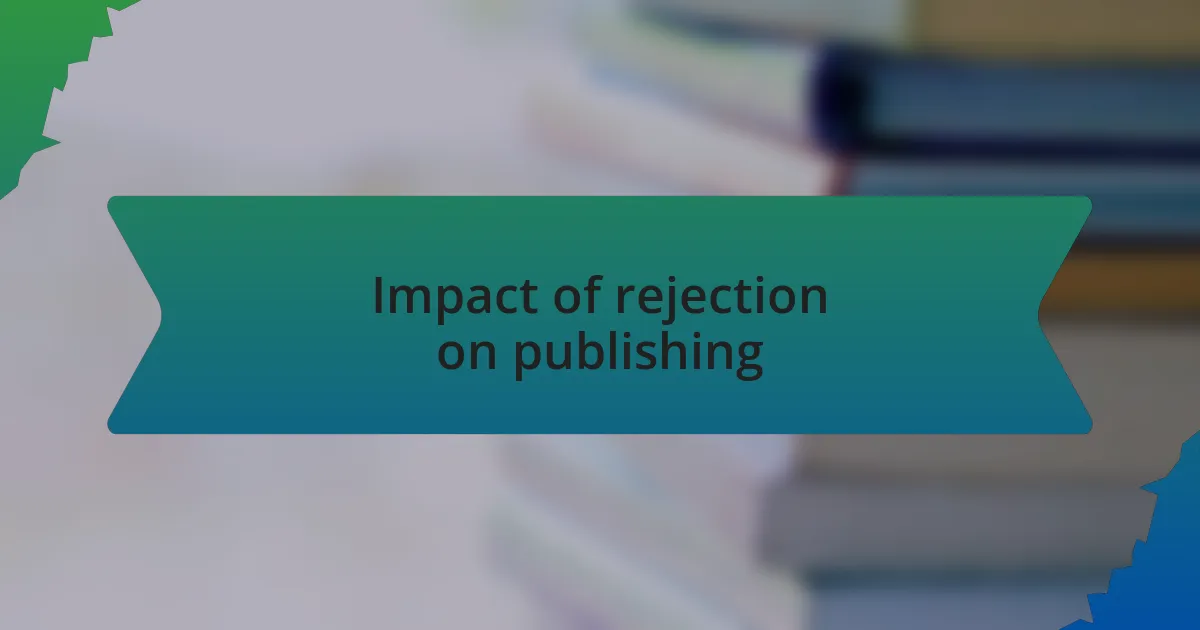
Impact of rejection on publishing
The impact of rejection in publishing can be quite profound, often leading writers to second-guess their talent and passion. I recall feeling utterly disheartened after receiving a form rejection letter on a piece I had poured my heart into. It was tough to shake off that initial sting, but I realized it also opened a door to deeper self-reflection and growth.
Rejection, while painful, can serve as a catalyst for improvement. I once faced multiple rejections for a poetry collection that felt incredibly personal to me. With each response came a twinge of doubt, but I discovered that revisiting my work with a critical eye allowed me to refine my voice and clarify my message. Have you ever turned a setback into an opportunity for growth?
Moreover, the fear of rejection often stifles creativity and innovation in aspiring independent authors. I’ve seen colleagues become hesitant to experiment with new styles or themes simply because they dread the possibility of negative feedback. This type of self-limiting belief can stifle not only individual progress but also the broader landscape of independent publishing, preventing fresh voices from emerging. It’s essential to view rejection not as an endpoint, but as a stepping stone toward finding the right audience for our work.
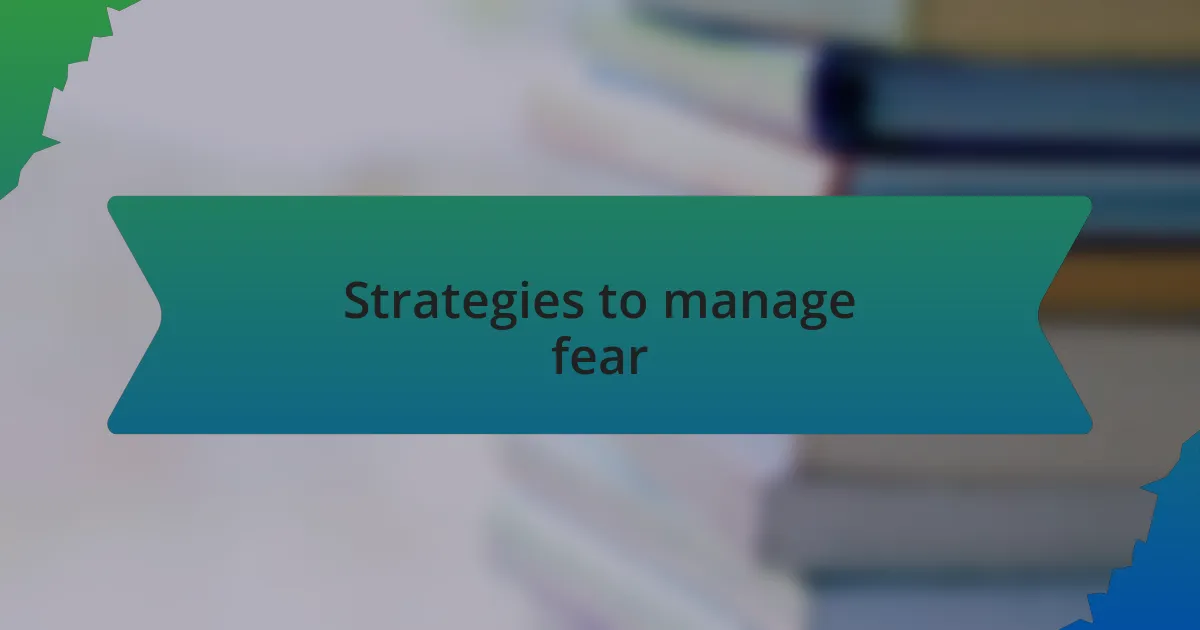
Strategies to manage fear
When facing the fear of rejection, one strategy I found immensely helpful was reframing my mindset. Instead of viewing each rejection as a personal failure, I learned to see it as an opportunity for feedback. I remember submitting a short story to a contest, and although it didn’t win, the judges’ comments provided me invaluable insights that I wouldn’t have obtained otherwise. Isn’t it fascinating how a single piece of advice can shift our entire perspective?
Another effective approach involves creating a support network of fellow writers. I surrounded myself with individuals who understood my journey and could offer encouragement when self-doubt crept in. I vividly recall a writing group I joined—sharing my work and hearing others’ experiences helped me realize I wasn’t alone in my fears. This community not only made the rejections feel less daunting but also fostered resilience. Have you ever thought how powerful it is to be part of a supportive group?
Finally, I started to embrace small, manageable risks in my writing journey. Instead of diving headfirst into submitting to major publishers, I first shared my work on social media platforms or local literary events. Each small step lessened my fear and built my confidence over time. I recall the rush of excitement when I received my first positive comment online—what a boost to my courage! How many small victories can you accumulate to combat the weight of potential rejection?
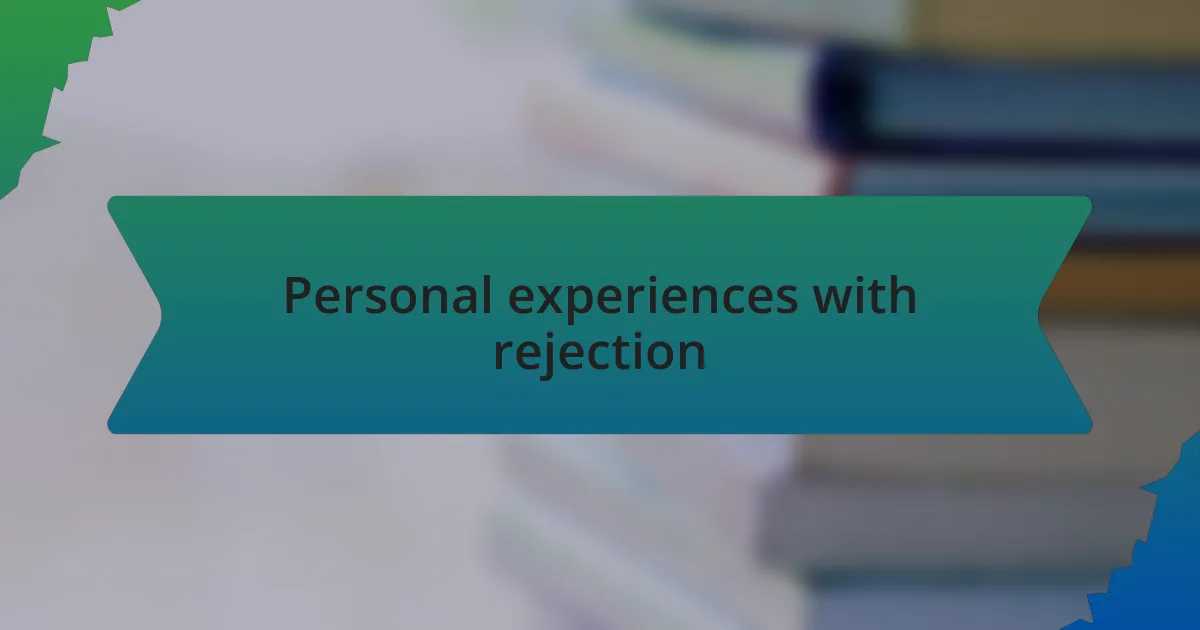
Personal experiences with rejection
When I first faced rejection from a literary magazine, it stung deeply. I poured my heart and soul into that piece, and receiving a standard rejection email felt like a dismissal of my passion. It took me a while to understand that a rejection didn’t define my worth as a writer—or as a person, for that matter.
One particular experience stands out to me: I submitted a novel manuscript that I had labored over for months. After hitting “send,” I was excited, but when the rejection came weeks later, the disappointment weighed heavily on me. Instead of allowing it to drag me down, I decided to take a different route. I reached out to a writing mentor for advice and learned techniques that not only improved my storytelling but also built my resilience. Have you ever found guidance in unexpected places after a setback?
Rejection became a part of my journey, shaping my writing in profound ways. Each “no” turned into fuel for my determination. I remember one day, feeling particularly dejected, I jotted down all the rejections I had received. That seemingly gloomy list transformed into a testament of my persistence. Each entry served as a reminder of my commitment to my craft. What if our rejections are just steps toward finding the right fit for our work?
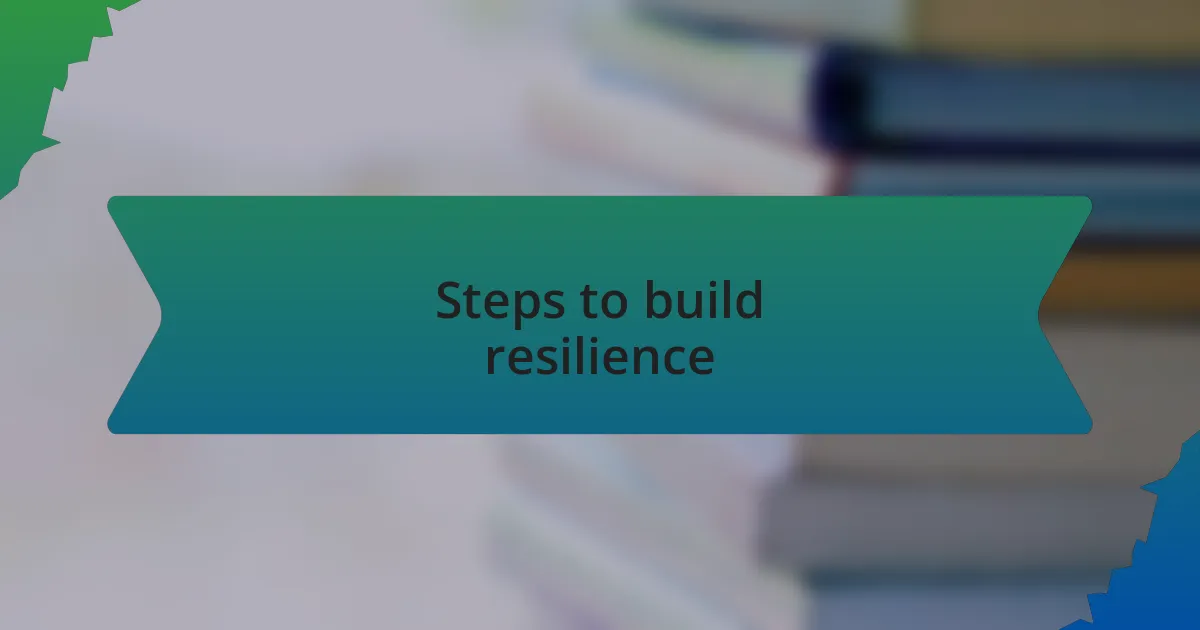
Steps to build resilience
Building resilience is a journey that requires conscious effort. One effective step I discovered is establishing a routine that includes reflection. After receiving a rejection, I would take some time to journal about my feelings and analyze what I could learn from the experience. This practice not only clarified my thoughts but gradually transformed my initial disappointment into a source of motivation. Have you ever tried capturing your emotions on paper? It can be incredibly cathartic.
Moreover, surrounding myself with a supportive community played a crucial role in honing my resilience. I joined a local writers’ group, where we shared our experiences and supported one another through various challenges. Hearing others articulate their struggles made me realize I wasn’t alone. Isn’t it empowering to know there are people who are navigating the same path?
Lastly, embracing the concept of growth mindset has been pivotal. I learned to see rejection as an opportunity for improvement. Whenever I faced a setback, I’d remind myself that every “no” was simply a step toward growth. Reflecting on past rejections, I see how they’ve shaped me into a stronger writer. What would happen if we approached every feedback with curiosity instead of fear? That shift in perspective can make all the difference in how we bounce back.

Celebrating small victories
Celebrating small victories is something I came to cherish deeply in my writing journey. After submitting an article, I would often take a moment to acknowledge the effort it took to hit that “send” button. It might seem insignificant, but pausing to appreciate that leap of faith helped me recognize my progress. Have you felt that rush of pride when you complete a task, no matter how small?
There was a time when I started sharing my work online, and the first few positive comments were like fuel to my confidence. Each “great job” or “I loved this” felt monumental, proving that my voice had value. This inspired me to keep pushing my boundaries. Reflecting on those initial affirmations, I realize that they served as stepping stones, lifting me closer to overcoming my fears. Can you recall a moment when someone’s encouragement made you believe in yourself a little more?
I’ve learned to create simple rituals that involve celebrating these achievements. For instance, after finishing a manuscript draft, I treat myself to a favorite snack or a fun outing, reinforcing the positive feelings associated with my hard work. It’s a way to mark my milestones and remind myself that every step counts. Isn’t it fascinating how these small, joyful moments can lay a stronger foundation for tackling bigger challenges ahead?